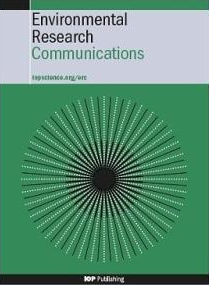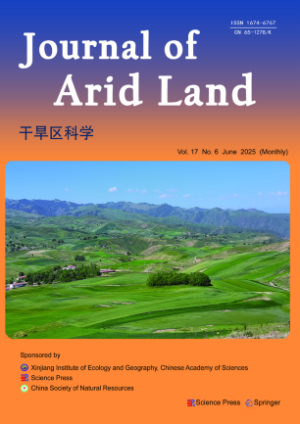-
30 Jul 2025 • Journal Article • Environmental Research Communications
Assessing sewage sludge-made biochar and compochar (compost+ biochar mix) as horticultural soilless growing media
AbstractOrganic and mineral growing media are commonly used in horticultural soilless systems for vegetable cropping in greenhouses and net-houses. However, extraction of these materials adversely affects environmental quality. The objective of this study was to assess the horticultural potential of biochar and compochar (a mix of biochar and compost) growing media—both produced
… show more -
24 Jun 2025 • Journal Article • Journal of Arid Land
Properties, challenges, and opportunities of the loess plains in the northern Negev Desert: A review
AbstractThe loess plains cover approximately 2000.00 km2 of the northern Negev Desert, accounting for about 9% of Israel’s total land area. As elsewhere, the loess in the Negev Desert is composed of wind-transported dust and sand particles that have been deposited in sink sites. The loess deposits are characteristically covered by biocrusts, which constitute a substantial share
… show more -
15 May 2025 • Journal Article • Agronomy
Bacterial Community Dynamics in Oil-Contaminated Soils in the Hyper-Arid Arava Valley
AbstractPetroleum pollution has become a substantial challenge in soil ecology. The soil bacterial consortia play a major role in the biodegradation of petroleum hydrocarbons. The main objective of this study was to assess changes in bacterial composition and diversity in oil-contaminated dryland soils. The Illumina MiSeq high-throughput sequencing technique was used to study
… show more -
Dec 2024 • Journal Article • Environmental Monitoring and Assessment
Fungal community dynamics in a hyper-arid ecosystem after 7 and 47 years of petroleum contamination
AbstractThis study investigates the impact of crude oil contamination on the fungal community dynamics in the Evrona Nature Reserve, situated in Israel’s hyper-arid Arava Valley. The reserve experienced petroleum-hydrocarbon-spill pollution at two neighboring sites in 1975 and 2014. The initial contamination was left untreated, providing a unique opportunity to compare its
… show more -
Jul 2024 • Journal Article • CATENA
Mass tree uprooting during a mega flash flood in the hyper-arid Wadi Zihor, southern Israel
AbstractOn April 10, 2023, exceptional weather conditions over southern Israel produced an extreme rainstorm. The peak precipitation, with a maximum rainfall depth of 62 mm and rain intensities exceeding 50 mm h−1, fell over the hyper-arid southern Negev and Arava Valley and generated a mega flash flood in Wadi Zihor. This ephemeral stream channel supported a
… show more -
1 Mar 2024 • Journal Article • Journal of Soil and Water Conservation
Eco-hydrological functioning of multi-aged dryland afforestation systems
AbstractContinual land degradation processes adversely affect the functioning of dryland ecosystems. In recent decades, extensive afforestation activities have been undertaken in marginal lands of the semiarid northern Negev region of southern Israel to mitigate such degradation processes. However, the long-term impacts of these actions in drylands, subjected to long-term
… show more -
1 Jan 2024 • Journal Article • CATENA
Ancient agricultural terrace walls control floods and regulate the distribution of Asphodelus ramosus geophytes in the Israeli arid Negev
AbstractAncient stone terrace walls aimed at harvesting water runoff and facilitating crop production are widespread across the drylands of the Middle East and beyond. In addition to retaining the scarce water resource, the terrace walls also conserve soil and thicken its profile along ephemeral stream channels (wadis) by decreasing fluvial connectivity and mitigating erosional
… show more -
26 Dec 2023 • Journal Article • New Forests
Cover cropping to prepare degraded lands for forestry: challenges and opportunities
AbstractCover cropping is practiced in conservation agriculture to preserve soil and water resources, alleviate soil compaction, sequester organic carbon, and control weeds. Meanwhile, cover cropping is rarely used in forestry, probably due to the lack of awareness of this management practice. In this short essay, we discuss the concept of utilizing cover crops to prepare
… show more -
12 Nov 2023 • Journal Article • Sustainable Environment
Analysis of herbal medicine among Bedouin of the Saint Catherine Protectorate (southern Sinai Peninsula) and its comparison to modern drug design
AbstractThe Saint Catherine region of southern Sinai Peninsula’s drylands encompasses a unique combination of geophysical conditions. These features have formed highly diverse habitats, which support extremely complex plant communities. Throughout history, the local Bedouin population has used many of these plants for therapeutic purposes. The objectives of this study were to
… show more -
1 Nov 2023 • Journal Article • Journal of Environmental Management
Unexpected consequences of afforestation in degraded drylands: Divergent impacts on soil and vegetation
AbstractForestry has long been considered an effective means of restoring degraded drylands worldwide. Often, afforestation in such lands relies on the establishment of runoff harvesting systems that are formed as contour bench terraces on hillslopes, increasing water availability for the planted trees and shrubs. The construction of terraces requires intensive earthworks by
… show more

















